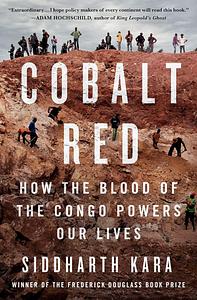You need to sign in or sign up before continuing.
Take a photo of a barcode or cover
No doubt this is one of the sadest books I have ever read. The fact that it is not fiction makes it even worse. I wonder what I can do. I was thinking of buying an eReader before reading the book and then I decided to wait till I find a way to recycle my old ones.
dark
emotional
informative
sad
fast-paced
This might be the most important book I’ve read in my life. Akin to “The Jungle”, Kara reveals the evil lurking at the root of the lithium-ion battery industry in which forced laborers, many of which are children, underpin the global economy.
challenging
emotional
informative
sad
slow-paced
2.75-3 Stars ⭐️
I am very grateful to have read about such an important topic that I am ashamed to say that I was completely ignorant to in my life. The information outlined in this book is something that everyone living in this modern age should know, no matter how hard of a truth it is. It is the difficult truth that we MUST seek to know in this era of exploitation and indifference.
What the Congolese people have been forced to endure for decades is nothing short of inhuman and evil. I am so saddened that by just existing every day with our technology, we not only maintain such a reality but we support it with our dollars.
I appreciated the information in this book and the way in which it was laid out. My critiques have mostly nothing to do with the book’s content and more to do with the execution. At times, it felt rather repetitive- but it is a repetitive situation- so that’s not that big of a deal. What actually began to bother me was how Kara, at times, seemed to push traumatized people to speak with him- oftentimes not realizing the pain he could’ve caused them in order to gather information. While he does admit at the end of the novel that he agrees that this story should be spoken about by the Congolese themselves, I felt like more care and concern for how he interviewed could’ve gone into this work. On top of that, I feel his answers about what should be done could’ve been further researched and clarified.
There are more reasons why it could’ve sat lower in rating for me, but I feel the most important message is not about that. The important message is this: Free the people of the Congo. They die every day just to be able to survive- because of corporate and human greed.
I am very grateful to have read about such an important topic that I am ashamed to say that I was completely ignorant to in my life. The information outlined in this book is something that everyone living in this modern age should know, no matter how hard of a truth it is. It is the difficult truth that we MUST seek to know in this era of exploitation and indifference.
What the Congolese people have been forced to endure for decades is nothing short of inhuman and evil. I am so saddened that by just existing every day with our technology, we not only maintain such a reality but we support it with our dollars.
I appreciated the information in this book and the way in which it was laid out. My critiques have mostly nothing to do with the book’s content and more to do with the execution. At times, it felt rather repetitive- but it is a repetitive situation- so that’s not that big of a deal. What actually began to bother me was how Kara, at times, seemed to push traumatized people to speak with him- oftentimes not realizing the pain he could’ve caused them in order to gather information. While he does admit at the end of the novel that he agrees that this story should be spoken about by the Congolese themselves, I felt like more care and concern for how he interviewed could’ve gone into this work. On top of that, I feel his answers about what should be done could’ve been further researched and clarified.
There are more reasons why it could’ve sat lower in rating for me, but I feel the most important message is not about that. The important message is this: Free the people of the Congo. They die every day just to be able to survive- because of corporate and human greed.
Graphic: Child death, Death, Slavery, Grief, Colonisation, Injury/Injury detail
Minor: Rape
dark
emotional
informative
medium-paced
challenging
dark
emotional
informative
reflective
sad
medium-paced
challenging
dark
emotional
informative
sad
tense
medium-paced
Graphic: Child death, Death, Sexual assault, Slavery, Trafficking, Injury/Injury detail
Moderate: Blood, Police brutality, Grief
Minor: Racism, Suicidal thoughts
challenging
dark
emotional
informative
sad
medium-paced
4.5 / 5
For a country that was the poster boy of the brutality of African colonization during the scramble for Africa, there tends to be little mention of how little of its relationship between itself and foreign influence has actually changed over the last couple of centuries
While state actors have changed and the most immediately exploiter of the Congo has shifted, the collective responsibility has remained much the same, contested between colonial powers such as China and Western companies and the corruption as well as complacence of local government. Seeing especially how this manifests in the context of civil war, the growing tech industry, etc., is extraordinarily interesting, and sheds a lot of light on the the hidden link that tends to be neglected when talking about 'improved worker rights' normally just focused on the factory workers who assemble the parts rather than those responsible for collecting said parts in the first place.
This book is extremely interesting, and definitely worth a read for the detail that is explored, the efforts to properly report on what is observed, and an acknowledgement of personal biases and efforts to surpass them.
4.5 / 5 very good good
For a country that was the poster boy of the brutality of African colonization during the scramble for Africa, there tends to be little mention of how little of its relationship between itself and foreign influence has actually changed over the last couple of centuries
While state actors have changed and the most immediately exploiter of the Congo has shifted, the collective responsibility has remained much the same, contested between colonial powers such as China and Western companies and the corruption as well as complacence of local government. Seeing especially how this manifests in the context of civil war, the growing tech industry, etc., is extraordinarily interesting, and sheds a lot of light on the the hidden link that tends to be neglected when talking about 'improved worker rights' normally just focused on the factory workers who assemble the parts rather than those responsible for collecting said parts in the first place.
This book is extremely interesting, and definitely worth a read for the detail that is explored, the efforts to properly report on what is observed, and an acknowledgement of personal biases and efforts to surpass them.
4.5 / 5 very good good






